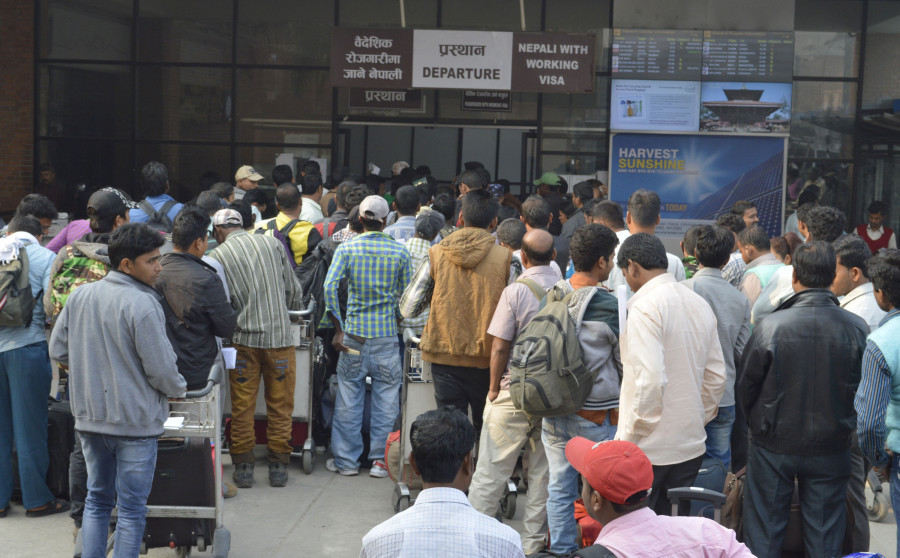National
Nepal needs to amend human trafficking laws to fully enforce Palermo Protocol, experts say
Existing laws define the crime in a narrow sense and fail to protect the victims, they argue.
Chandan Kumar Mandal
Nepal needs to make changes to several of its laws to comply with the Palermo Protocol to protect its citizens from human trafficking and ensuring their human rights, right activists say.
After several years of waiting, Nepal became the 176th country to ratify the Protocol to Prevent, Suppress and Punish Trafficking in Persons, especially Women and Children, commonly known as Palermo Protocol, in June last year, also the most recent one, to ratify the protocol.
Right activists have long been calling for ratification of the protocol, the first global legally-binding instrument with an agreed definition on trafficking in persons, and protecting Nepalis at home and abroad.
“Nepal finally ratified the Palermo Protocol at the height of the pandemic-induced lockdown last year. Nepal is a champion in signing such conventions but lags in implementation,” said Sabin Shrestha, an advocate. “When Nepal ratified the protocol, it was among only 17 countries that were yet to ratify this document. Even South Asian countries and those in the Persian Gulf had done it before Nepal.”
Now rights activists say the government needs to make necessary changes in the country’s prevailing laws to fully enforce the protocol to save Nepalis from being trafficked and ensuring their rights.
According to rights activists, Nepal as a country that sends its citizens to work abroad and a country that has been seen as a source, transit and destination country for human trafficking, can benefit from its enforcement.
The protocol aims to prevent and combat trafficking in persons, paying particular attention to women and children; to protect and assist the victims of such trafficking, with full respect for their human rights; and to promote cooperation among States Parties to meet those objectives.
However, for all these things to happen, the country needs to make changes to laws that govern human trafficking.
According to Shrestha, there are at least nine laws such as Human Trafficking and Transportation (Control) Act, 2008, Foreign Employment Act, 2007, Immigration Act 1992, Child Labor (Prohibition and Regulation) Act, 2000, Labour Act, 2017 among others, need to be amended in line with the protocol so that Nepali citizens’ rights can be safeguarded as per the protocol.
“Ratification and enforcement of the Palermo Protocol are vital because most of the human trafficking is happening in the form of foreign employment,” said Shrestha. “Nepal can’t always protect its citizen rights as it may not have bilateral agreements with all destination countries,” said Shreshta, executive director at the Forum for Women, Law and Development (FWLD), a non-governmental organisation working for promoting non-discrimination and equality.
“As labour receiving countries have also ratified the protocol, they also have their accountability to protect our citizens and if there are any violations of Nepali migrant’s rights, Nepal can also make them hold responsible,” said Shrestha. “Also the protocol saves migrants from double victimisation of first being trafficked and then treated as illegal migrants in destination countries.”
Rights activists also point out that existing laws either fail to encompass broader definitions of human trafficking, have limited coverage or provisions of minimum punishment for perpetrators.
For instance, although components of human trafficking are involved in foreign employment-related fraudulent activities or exploitation of migrant workers, these cases are often dealt with under laws that govern foreign employment than the heinous crime of human trafficking.
“Even victims prefer going for foreign employment-related laws for two reasons—higher compensation and social stigmatisation of being trafficked if the case is dealt as per human trafficking laws,” said Shrestha. “If existing laws are not amended, then there will be conceptual challenges as our laws have narrow definitions of human trafficking and related crimes. Under such narrow definitions, neither conviction will happen, nor will victims get justice or protection. If only our definitions match with international definitions, Nepal can hold other countries accountable.”
While the country should be ramping up its laws to protect its citizens from trafficking and other forms of abuses, the government has been coming up with new rules to limit their movement, activists said. This will only compel women to take unsafe routes, they added.
The Ministry of Women, Children and Senior Citizens has begun preparations to update the laws as per the Palermo Protocol, according to Roshani Shrestha, joint secretary with the Women’s Ministry.
“Following the ratification, we have started work to making changes to the laws related to human trafficking. The ministry is also working on the National Action Plan for combating human trafficking,” said Shrestha, also the chief of the Women Empowerment Divison under the ministry. “The ministry will be holding consultations with stakeholders soon. The new changes will be forwarded to the Law Ministry before the changes are proposed.”
However, rights activists argue that the government should speed up the process of making required changes as it might take a long time while Nepalis continue to migrate.
“Making required changes is urgent because even amidst the pandemic Nepalis are migrating abroad,” said Roshana Pradhan, programme officer at FWLD. “The protocol is not only about their protection, but also about their rescue, repatriation, rehabilitation and reintegration of the victims. Without amendments, things on the ground can’t move ahead as these laws guide the whole process.”




 13.12°C Kathmandu
13.12°C Kathmandu














